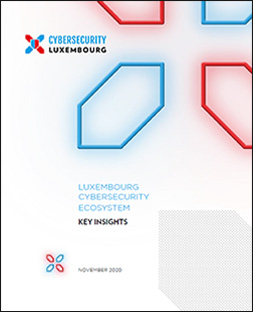룩셈부르크의 사이버 보안에 대해 알아야 할 5가지 사항
강력한 국가 사이버 보안 생태계는 룩셈부르크의 신뢰할 수 있고 안전한 데이터 기반 경제를 발전시키는 핵심 축이다. SECURITYMADEIN.LU와 룩스이노베이션이 공동 진행한 새로운 연구를 통해 룩셈부르크 사이버 보안 생태계의 강점과 고유한 특성에 대한 5가지 핵심 통찰력을 제공한다. 사이버 보안 생태계 매핑을 살펴보고 ‘룩셈부르크 사이버 보안 에코시스템 – 핵심 통착력’을 아래에서 다운로드하여 볼 수 있다.
Digitalisation is at the heart of Luxembourg’s strategy for fostering a sustainable and competitive economy, and cybersecurity is an obvious cornerstone. It is also an increasingly important consideration for companies.
Cybersecurity: a critical element
“Cybersecurity has moved from being a cost centre to a critical element of any company,” David Foy, Head of International Business Development – Digital Economy at Luxinnovation, points out. “There are very few, if any, companies operating without some form of digital process that generate data, and as soon as this data is exploitable, it must be protected. The EU has very strict data governance laws that are designed to protect the customer and also to render data processors responsible for the lifecycle management of that data. For any company using and storing data, high cybersecurity standards are a must.”
There is a drive in the EU to develop European and regional cybersecurity solutions as a way to reduce the dependence on non-European tech providers. In order to get a clear overview of the cybersecurity solutions and services that are already available in Luxembourg, SECURITYMADEIN.LU and Luxinnovation have produced an interactive mapping of the cybersecurity ecosystem and an accompanying study entitled Luxembourg Cybersecurity Ecosystem – Key Insights.
Five key insights
 In the study, SECURITYMADEIN.LU and Luxinnovation list five key insights:
In the study, SECURITYMADEIN.LU and Luxinnovation list five key insights:
- Luxembourg is among the front-runner countries both in Europe and in the world for its cybersecurity commitment
- The ecosystem relies on an active collaboration between public and private stakeholders. The role played by the Ministry of Economy, which sees cybersecurity not only as a defence issue but also as an economic success factor, makes Luxembourg a unique case in Europe
- The Luxembourg ecosystem is steadily growing and attractive to start-ups. 50% of companies are less than 5 years old
- The important role played by small companies, and the limited number of cybersecurity key market players, is typical for the EU where there are new market opportunities for European cybersecurity solutions
- Solutions offered by the national ecosystem cover the whole risk management supply chain, with a slight specialisation in risk identification and systems protection
“The commitment and expertise of Luxembourg is widely acknowledged: the country ranks 11th globally and 7th in Europe according to the Global Security Index,” comments Sara Bouchon, Head of Market Intelligence at Luxinnovation and one of the authors of the study. “Luxembourg also ranks 2nd worldwide and 1st among the EU member states in Cisco’s 2019 Digital Readiness Index.”
One of the key assets of the Luxembourg ecosystem is its diversity and multidisciplinary approach. “A majority of providers are SMEs, which makes the ecosystem very dynamic, agile and resilient to change and crisis,” says Pascal Steichen, CEO of SECURITYMADEIN.LU. “Cybersecurity no longer focuses only on IT, but also on areas such as legal aspects, communication and social competence. Luxembourg’s ecosystem clearly evolves in these fields and is able to adjust quickly and adapt to future challenges.”
The Luxembourg government provided the right context for the ecosystem to develop and for cybersecurity to become a pillar of the national economy.
He underlines that this development has been made possible by the continuous involvement and investment of the Ministry of the Economy. “The Luxembourg government provided the right context for the ecosystem to develop and for cybersecurity to become a pillar of the national economy.”
Agility, openness, opportunities
Luxembourg has been identified as a “European cyber valley” and stands out for its manageable size and high level of agility. “In a field such as cybersecurity, which evolves extremely fast, it is crucial to be able to prototype and test new ways of working or innovative solutions quickly,” underlines Mr Steichen.
The country is also characterised by its openness to new technology and opportunities offered. “Luxembourg is always looking to diversify its economy and add value to products and services. Innovation is a reflex here, and extends to all sectors,” says Mr Foy.
Regulations can be quite different here compared to other parts of the world, but the key is to see them as enablers rather than constraints.
He advises international companies interested in launching business activities in Luxembourg and Europe connected with data and cybersecurity to pay close attention to rules and legal frameworks. “When I recently contested a parking ticket, the answer ‘ignorance is no excuse for breaking the law’ was barked at me. The same goes for cybersecurity. Regulations can be quite different here compared to other parts of the world, but the key is to see them as enablers rather than constraints. Seek out local entities such as SECURITYMADEIN.LU – they are open and available, and can offer expert guidance to companies entering new markets.”

